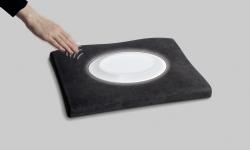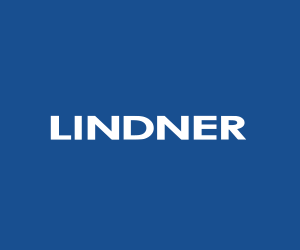plasticker-News
| 2010-09-13 |

|
Georg Kaufmann Formenbau AG at K 2010
  Photo 1: The brightness of the EL film in the inner part of the specimen moulding can be controlled by means of a capacitive sensor integrated in the outer part. Photo: Georg Kaufmann Formenbau AG, Busslingen/Switzerland Two main themes serve to highlight the performance and innovative features of the injection mould systems presented by Georg Kaufmann Formenbau AG, Busslingen/Switzerland, at K 2010. These themes are:
 Photo 2: This specimen moulding, back-moulded in one single machine cycle, features a fabric or alcantara covered outer part, while the inner part consists of a film backed with a layer of soft-touch foam. Photo: Georg Kaufmann Formenbau AG, Busslingen/Switzerland The many possibilities of functional surface design will be demonstrated at K2010 by means of specimen mouldings under four surface ambience related themes: Sensor, Touch, Lighting and Surface. Roger Kaufmann, Head of Development and Sales, says: “Plastic components with functional surfaces and integrated capacitive sensors open up a whole new world of applications – not just in the automotive industry but far beyond.” Even when it comes to the production of moulded parts with functional surfaces, all technologies developed by Kaufmann have one thing in common: what used to be separate production steps are now combined into one single, highly automated production sequence, thus enabling the cost-efficient production of high-quality multifunctional parts. Demonstration mould highlights potential scope and advantages Kaufmann has developed and – with support from KraussMaffei – built a demonstration mould for visualizing the possibilities offered by the technologies used by the company. In the Kaufmann Tech-Center it serves to produce specimen mouldings that are characteristic of the parts produced with these technologies. These mouldings comprise an outer part, which usually features a decorative fabric material, and an inner part featuring decorative and/or special-function materials that can for the most part be freely chosen. In this way it is possible to produce specimen parts with a diversity of functions and surfaces relevant to planned future applications, thus readily enabling developers and designers to compare and evaluate various possible designs on one and the same moulded part. For the making of the specimen mouldings, the demonstration mould utilizes Duo Lamination technology as well as other tried-and-tested technologies, thus ensuring that no process or mould related problems can occur later under actual production conditions. Only the usual fine adjustments are necessary before the moulded part is put into production. The scope of performance and application of the parts produced with the demonstration mould is exemplified by four surface ambience related themes:
Network strategies – the plastics industry’s answer to globalization In order that all potential users in other branches of the plastics industry can also benefit from these production technologies, Kaufmann endorse in the sense of PRIMUS Network an intensive network strategy between, on the one hand, machine manufacturers, toolmakers, producers of raw materials and films and, on the other, users and processors. The goal: Step-by-step processes and the traditional separation of development and production planning must be replaced by the integrated and interlinked optimization of both products and processes. This way of operating will always bring about improved and often innovative, generally applicable solutions. As it is implemented very early on in product development, it considerably broadens the hitherto rarely exploited possibility of utilizing know-how and experience across different branches of industry. Such a network strategy, that is to say, a systemic approach to development and production is the industry’s answer the challenge of globalization: it reaches beyond the boundaries that separate the individual branches of the plastics industry, just as globalization has broken down the geographical boundaries between the countries of the world. And in much the same way as globalization has become the recipe for success in business and industry; this network strategy is the recipe for success in production technology. It goes without saying that Kaufmann implements this network strategy to an optimum extent. In its own technical centre, the company undertakes complete development projects for its customers, working in partnership with other companies and institutions. For these projects, Kaufmann’s experts possess the necessary expertise for every stage of development, from the initial spark of creativity to the process-oriented design and rating of the mould to the customized application of both the mould and the machine technology in the actual production process. More Information: www.gktool.ch K 2010, 27.10.–3.11.2010, Düsseldorf, Hall 15, Stand 15/C24 |
Georg Kaufmann Formenbau AG, Busslingen, Schweiz
 back to news list back to news list |  back to top back to top |












